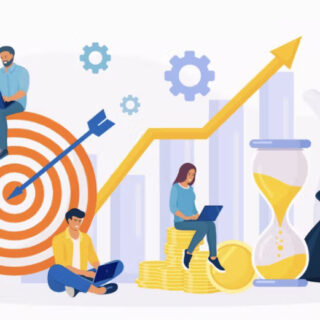
 In physics, Velocity is known as an object’s rate of change with respect to its location. Velocity is not the same thing as speed. Speed is very important when it comes to the time-value of money, bandwidth, profits, and costs. The problem with using speed as a measure of progress is that it only tells you the rate of movement. Velocity is a measure of both direction and rate of movement.
In physics, Velocity is known as an object’s rate of change with respect to its location. Velocity is not the same thing as speed. Speed is very important when it comes to the time-value of money, bandwidth, profits, and costs. The problem with using speed as a measure of progress is that it only tells you the rate of movement. Velocity is a measure of both direction and rate of movement.
Who cares how fast you get “there” if you do not know where there is? There are many elements that can link to strategy and execution but no CEO or Manager can escape the fact that they must think before, during, and after they move.
A Ticket to Springfield
A nationally renowned speaker, Don Connelly, once told a story of a man who was concerned about his business ventures in Springfield. He went to the Amtrak station to buy a train ticket. However, when the attendant asked the man whether he wanted a ticket to Springfield, Ohio, Tennessee, North Carolina, or Kentucky, the man simply replied, “Whichever one will get me there the fastest!”
Many people in the world of business relationships are like the man buying a train ticket to Springfield. They are not so particular about which Springfield (or definition of success) they are pursuing, only which one is the quickest and easiest to attain. Those who do not take the time to specify their destination, plan appropriately and define their particular definition of success will often waste their talents on trips to places they do not want to go.
Groupon Speed
Consider the Groupon phenomena as an example of a company or concept moving faster and acquiring more momentum… In 2008, Andrew Mason founded the tech startup out of an existing company. He then set out to create a viral marketplace for those seeking to harness “the power of the crowd” for consumer discounts. What he and his team created was a source of momentum for social couponing. Groupon quickly became a staple in the daily lives of consumers and retailers alike. In three short years, the company rose from its humble beginnings to a social media giant that eventually turned down a $6 Billion dollar offer from the search-engine behemoth Google.
Groupon grew into a colossal organization with more than 10,000 employees virtually overnight. The founder and CEO of Groupon has since resigned as holes in the original business plan and the inability to create a sustainable a flow of repeat customers ultimately diminished Groupon’s value proposition. It’s a perfect example of simply moving too fast and lacking a few strategic guardrails that could have prevented the problems.
It was not that the founders of Groupon did not want to repair their foundational problems, it was that they couldn’t. The company was too big, was moving too fast, and was making too much money to change its course.
Strategic Movement
 Speed is moving fast. Velocity is speed in a given direction. However, strategic velocity is the optimum speed in the optimum direction to accomplish the strategic objectives.
Speed is moving fast. Velocity is speed in a given direction. However, strategic velocity is the optimum speed in the optimum direction to accomplish the strategic objectives.
There have been many companies and products that have suffered the same problems and outcomes as the above. Groupon grew so quickly that they could not sustain the promised value proposition, and they were moving too fast to change the business model. It is one thing to be built to for speed, but another to be built to reach the intended destination.
To learn more about strategic movement, check out the new book, Relationship Momentum.
The article was written by guest author Brian Church. Brian is the founder and Chief Executive Officer of a Consulting Firm called Ambassadors International. Brian’s book, “Relationship Momentum” is about the secret to making ideas and initiatives move. Brian lives with his wife Kimberly and son in Nashville, TN. His mission is to help Entre and Intrapreneurs activate their ideas by creating movement in a consistent direction.











